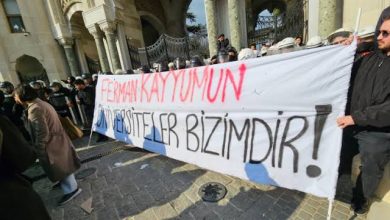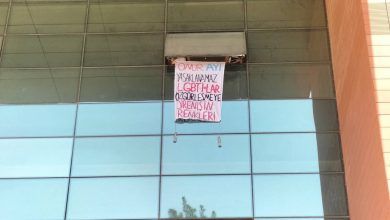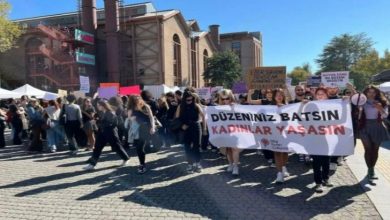*Selinay Uzuntel
Female students from Istanbul University talked about what they experienced as November 25 approached.
The Mirabel Sisters were brutally murdered by the regime in the Dominican Republic in 1960. Patria, Minerva and Maria Teresa, known as the “Butterflies” from that day on, became symbols of resistance against the Trujillo dictatorship and inspired all women who refused to bow to the oppression of authoritarian regimes. Since 1999, the anniversary of the Mirabels’ death, November 25, has been celebrated as the “International Day for the Elimination of Violence Against Women” every year, a day when women around the world take to the streets to increase solidarity and struggle. As we approach November 25, 2024, women, especially young women, in Turkey are struggling with dozens of problems. We asked female students from Istanbul University about their experiences while November 25 was approaching.
“We have to work in insecure jobs”
Işıl said that she has been following the budget discussions in parliament recently.
‘‘In the budget announced for 2025, while approximately 17 billion TL was allocated to ‘Strengthening the Family’ funds, only 6 billion TL was allocated to ‘empowering women’. It means only 38 cents per woman per day. While KYK scholarships and loans fall far short of meeting even the basic needs of students, we are forced to work in low-wage and insecure jobs to survive.”
Işıl’s last job was at a chain coffee shop. Her experiences there should not be unfamiliar to any young woman:
“I don’t know if we were getting equal pay for equal work because we weren’t allowed to talk about it. We weren’t allowed to look at our phones either. We were told to put our phones in the closet and not touch them. When we tried to look at them for various reasons, they would say, ‘You’re setting the work back’, and that would be an excuse for mobbing.”
When it came to the issue of harassment, she said that both managers and customers harassed her at her workplace and that she could not remember the number of times it happened. We agreed that poverty deepens violence.
“We are taught to live in fear and anxiety”
The year 2024 is not over yet, but the number of women murdered has reached 397. With every article we write, we have to check the number of women murdered to see how many more women have been murdered. According to the data of the Ministry of Justice, the number of cases opened for child abuse crimes last year was more than 66 thousand. There is not even official data on the children who have disappeared in the previous 8 years!
Leyla shared her thoughts on the increasing number of murders of women and children as November 25 approaches:
‘‘In this country, women are found dead with complaint petitions in their hands and protection orders in their bags against their murderers. News of children’s deaths has started to come every day. We are being taught to live in fear and anxiety.’’
The withdrawal from the Istanbul Convention, which protects the rights of women and LGBTI+ individuals, the targeting of Law No. 6284, changes in the enforcement laws and the measures not taken are making violence systematic. It was not for nothing that the slogan “Femicide is political” was the most chanted in the mass protests that took place in the university after the brutal murder of Ayşenur and İkbal by a man. The impunity system in the country fails to prevent femicides; on the contrary, it fuels violence.
Leyla continued by explaining the reasons for the increase in these murders:
”I noticed something, especially in the protest we held for Ayşenur and İkbal. Many banners read, ‘The perpetrator is not alone, the violence is not isolated, the violence is systematic’. That was the case; I thought about it. The perpetrators of violence are protected thanks to the state’s impunity policies, attempts are made to cover up abuse, and the sentences of the perpetrators are reduced.”
“We try to hold our meetings even if it is in a cafe”
The demands for a safe campus are combined with the impunity of harassment and violence cases. Rojbin, a member of the Women’s Studies Commission, explained the status of the November 25 events and the course of the struggle at the university as follows:
‘‘I can see that we are in a relatively better situation at Istanbul University. At least we have CITÖK, although it does not work effectively. As in other schools, permission for our events is either given late or not at all. Even with permission, various bureaucratic obstacles make the events practically impossible. But we still try to find a place to meet, even if it is in a café.’’
She expressed her anger by saying, “We stand by our women friends from IAU. They are not alone; they should trust our solidarity” regarding the dissolution of the board of the Istanbul Aydin University (IAU) Women’s Studies Club on the pretext of sharing photos of the protest organised for Aysenur and Ikbal in which thousands of students attended.
Rojbin concluded: “Every meeting we try to hold is challenging. That’s why even though dozens of women in the crowd at our protests are members of the Women’s Studies Commission or follow us, this is not reflected in the events. That’s why I think we should support our Commission more, and each of our women friends should try to get a handle on something more.”
“We want the whole of life, not just crumbs”
Young university women are aware of this spiral of violence and are looking for a method to establish a secure and nonviolent life. All these pressures are an effort by those who know what women can change when they come together and are afraid of it, by bossism and its representatives in universities who try to prevent women from organising and struggling, to suppress women’s solidarity and leave it unorganised.
Of course, the slogan “Long live women’s solidarity” reminds us of a fact everywhere: we get strength from unity. However, we should not miss what will strengthen and grow this solidarity. Just as we agree more than yesterday that violence is systematic, it is also necessary to confront this with the fact that young women in universities need a systematic and organised struggle.
For example, as Rojbin stated, the crowd in the mass actions that took place after the murder of Ayşenur and İkbal did not persistently continue the same anger, excitement and sense of solidarity afterwards. The desire to be present in activities, meetings, and spaces that would make togetherness permanent was limited to individual agendas. Of course, this struggle that demands continuity requires taking responsibility. It also involves seeing the organisational process behind an action that is considered developing independently, the effort put in for an event to occur, and becoming a part of it. It is undoubtedly the more difficult part, but we should also see that unless we do this, we will be weaker in the face of attacks on our rights and lives.
Despite all these conditions, November 25th is a day when young women in universities raise both of their demands for the activation of CİTÖBs for safe campuses and fight against harassment, mobbing and inequality in education. It will be a day when women students show that they are defending their rights and lives against the inadequacy of dormitories, scholarships and accommodation opportunities.
The courage that young women of universities who want justice, equality, a free, non-violent future, who stand up against the system of impunity, who say, “We want the whole of life, not just crumbs,” get from their unity will fill the streets on November 25th.



